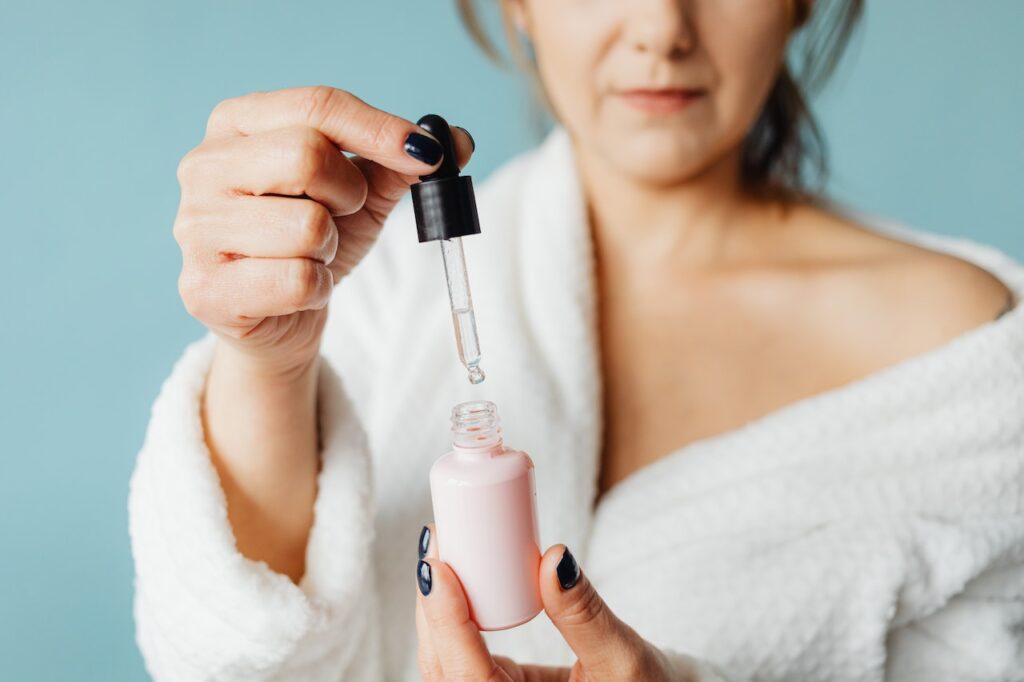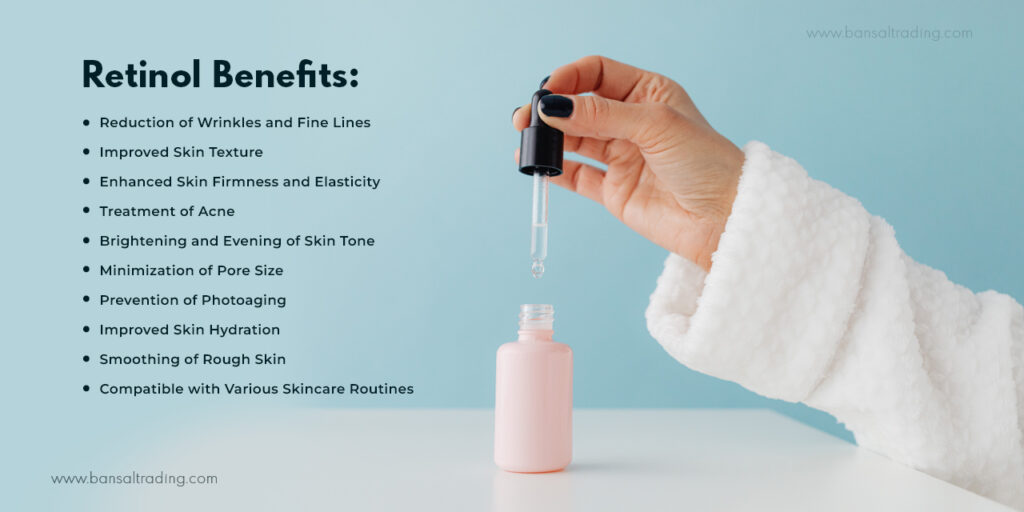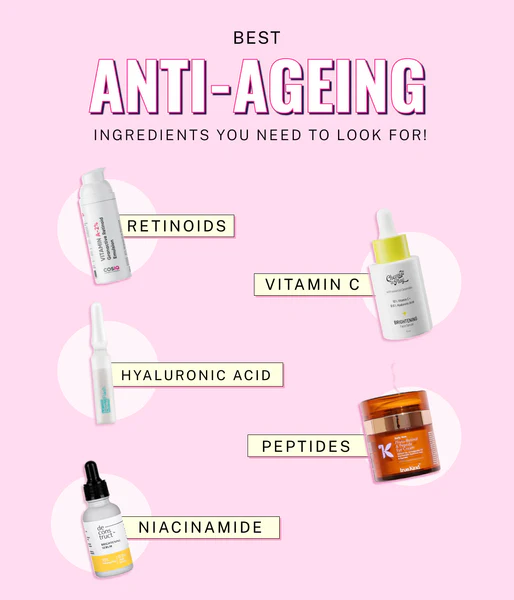
Retinol, a Vitamin A derivative, is a gold-standard skincare ingredient that accelerates cell turnover, stimulates collagen, and reduces wrinkles, acne, and pigmentation. With consistent, careful use, it improves skin texture, firmness, and radiance while protecting against oxidative damage.
Key Takeaways
- Boosts collagen and elastin to smooth wrinkles and firm skin.
- Speeds up cell renewal to clear acne and refine texture.
- Fades pigmentation and evens tone by regulating melanin.
- Acts as an antioxidant, defending against UV and pollution damage.
- Should be used at night with sunscreen during the day.
- Start with low concentrations and increase gradually to prevent irritation.
- Avoid during pregnancy; pair with moisturizer for balanced results.
Introduction to Retinol for Skin Care
Retinol is a form of Vitamin A commonly found in over-the-counter skincare products. It works by encouraging the skin to renew itself more quickly, promoting cell turnover and stimulating collagen production. This process helps to improve skin texture, tone, and clarity, making it a sought-after ingredient for maintaining youthful skin. Originally popularized for its anti-aging properties, retinol has become an essential in skincare routines worldwide.
Retinol and Skin Cell Turnover
Retinol functions by speeding up skin cell production and exfoliation. Your skin naturally sheds dead cells and replaces them with new ones, but this process slows down with age and lifestyle factors like poor sleep quality. Retinol helps to restore this natural rhythm by increasing the rate of cell turnover. This benefits the skin by reducing clogged pores and improving skin texture, giving your skin a fresher, smoother appearance.
Benefits of Using Retinol in face

Retinol has become a skincare essential for many because of its wide-ranging benefits for the face. Derived from vitamin A, retinol works deeply within the skin to promote renewal and address multiple skin concerns effectively. Here are some of the key benefits of using retinol on your face.
Anti-Aging Benefits of Retinol
A primary reason many people turn to retinol is its proven anti-aging effects. It encourages the production of collagen and elastin, two proteins that keep skin firm and elastic. With regular use, retinol reduces fine lines and wrinkles and helps tighten skin to bring back a youthful firmness. It also helps to repair and prevent damage caused by sun exposure, such as pigmentation and sunspots often misunderstood due to common skincare myths. Compared to prescription retinoids, over-the-counter retinol offers a milder but still effective alternative with fewer side effects.
Acne Treatment and Prevention with Retinol
Retinol is highly effective at managing acne. By unclogging pores and reducing excess oil production, it prevents future breakouts. Retinol also supports the healing of acne scars and minimizes their appearance over time. Its ability to promote cell renewal makes it a valuable treatment option, especially for teenagers struggling with acne. It works differently and sometimes better than other acne medications by addressing multiple aspects of acne formation.
Brightening and Evening Skin Tone
One of retinol’s most appreciated benefits is its capacity to reduce hyperpigmentation and dark spots. Through its exfoliating action, it helps shed pigmented dead skin cells and inhibits the production of melanin, the pigment responsible for dark patches. This results in a more even skin tone and a brighter complexion. Studies support retinol’s effectiveness in treating melasma and pigmentation issues, making it a go to ingredient for skin brightening.
Retinol as a Protective Antioxidant
Retinol also plays a role as an antioxidant. It neutralizes free radicals unstable molecules that damage skin cells due to environmental stressors like pollution and ultraviolet rays. By reducing oxidative damage, retinol helps protect the skin’s deeper layers, supporting long-term skin health and resilience.
Retinol’s Role in Improving Skin Texture
Regular use of retinol leads to smoother and softer skin. It visibly reduces the appearance of pores and can diminish rough patches and dullness. This improvement in texture happens as retinol encourages new, healthy skin cells to surface, replacing damaged and uneven layers.
Practical Considerations for Using Retinol
When starting retinol, it’s important to introduce it gradually. Begin with a low concentration and increase usage frequency as your skin builds tolerance. Apply retinol products at night and avoid mixing with other potent active ingredients like acids or Vitamin C to prevent irritation. Expect some initial dryness or redness, which usually subsides with time. Always combine retinol with sunscreen during the day because it can increase skin’s sensitivity to sunlight.
How Retinol Compares to Other Anti-Aging Ingredients

Retinol is a leading ingredient in anti-aging skincare, but it is often compared with other popular ingredients like peptides, Vitamin C, hyaluronic acid, and exfoliants such as AHAs/BHAs. Each of these has distinct roles and benefits, and understanding their differences can help you build an effective skincare routine tailored to your skin’s needs.
Retinol vs. Peptides
Retinol promotes skin renewal by speeding up cell turnover and stimulating collagen production. Peptides, on the other hand, signal the skin to repair itself. While retinol delivers faster results in reducing wrinkles, peptides are gentler often recommended for men’s skincare routines.
- Effectiveness: Retinol generally delivers more dramatic and faster results in reducing wrinkles, fine lines, and improving skin texture. Peptides provide gentler, sustained repair and are excellent for strengthening the skin’s barrier.
- Suitability: Peptides are better for sensitive or dry skin as they are moisturizing and less likely to cause irritation. Retinol can cause dryness, redness, or peeling, especially when first introduced.
- Usage: Retinol is often recommended for nighttime use, while peptides can be used in daytime routines, even alongside Vitamin C serums for added benefits.
- Combination: They can be used together for a comprehensive anti-aging approach, with peptides helping to mitigate some of retinol’s harsh effects.
Retinol vs. Vitamin C
Retinol targets skin renewal and collagen stimulation directly at the cellular level, improving wrinkles and texture. Vitamin C is a powerful antioxidant that protects against environmental damage and brightens skin by inhibiting melanin production.
- Benefits: Retinol is superior for reducing fine lines, wrinkles, and epidermal thickening. Vitamin C excels at brightening the complexion, evening skin tone, and protecting from sun damage when used with sunscreen.
- Skin Sensitivity: Vitamin C is generally gentler and suitable for daily morning use. Retinol can cause irritation and should be introduced gradually, typically used at night.
- Synergy: Using both can maximize anti-aging benefits; Vitamin C protects skin from free radicals during the day, while retinol promotes skin renewal overnight.
Retinol vs. Hyaluronic Acid
Retinol is primarily an anti-aging agent that stimulates collagen and cell turnover. Hyaluronic acid (HA) is a powerful hydrator that attracts and retains moisture, plumping the skin.
- Benefits: Retinol smooths wrinkles and improves texture but can be drying. Hyaluronic acid provides immediate hydration, reduces dryness, and maintains skin elasticity.
- Suitability: HA is suitable for all skin types, including sensitive and dry skin, and can soothe skin that is irritated by retinol.
- Combination: HA is often included in retinol formulations or used alongside it to offset dryness and enhance skin barrier function, creating a balanced anti-aging routine.
Retinol vs. AHAs/BHAs (Alpha and Beta Hydroxy Acids)
Retinol accelerates cell turnover by working inside the skin cells. AHAs (like glycolic acid) exfoliate the skin surface by loosening dead skin cells, improving texture and brightness, while BHAs (like salicylic acid) penetrate pores to clear oil and reduce inflammation.
- Benefits: Both retinol and AHAs/BHAs help smooth skin, reduce fine lines, and treat acne. AHAs are best for surface exfoliation and moisture retention, BHAs are great for oily, acne-prone skin.
- Usage: AHAs and BHAs are generally used for exfoliation and can cause sensitivity if combined improperly with retinol. It’s usually recommended to alternate their use or consult a dermatologist for layering.
- Synergy: When used properly, retinol and AHAs/BHAs can complement each other by targeting different layers and concerns of the skin, enhancing overall skin renewal and clarity.
Myths and Misconceptions About Retinol
Retinol is one of the most researched and effective skincare ingredients, yet it remains surrounded by several myths and misunderstandings. Here, we clarify some of the most common doubts about retinol, focusing on skin thinning, its speed of results, and use during pregnancy.
- Retinol Does Not Thin the Skin: The common belief that retinol thins the skin is false. What retinol actually does is speed up the shedding of dead skin cells on the surface, which might cause temporary peeling or redness at the start of use. However, it stimulates collagen production in the deeper dermis layer, leading to thicker, stronger, and more resilient skin over time. This collagen boost helps reduce fine lines and improve skin texture rather than causing thinning.
- Retinol Is Not a Quick Fix: Retinol requires consistent and patient use. Unlike miracle creams that claim instant results, real improvements in wrinkles, pigmentation, and skin firmness typically take several weeks to months to become visible. Most people start seeing noticeable changes after 4 to 12 weeks, with more significant benefits appearing after 3 to 12 months of use.
- Retinol Is Not Safe During Pregnancy: Pregnant or breastfeeding women should avoid retinol due to potential risks. Retinol and other retinoids are forms of vitamin A which, in high amounts, can cause birth defects known as fetal retinoid syndrome. Even topical retinol can be absorbed into the bloodstream, posing risks to fetal development. Medical guidelines recommend discontinuing retinol before conception and throughout pregnancy to ensure safety.
- Using More Retinol Does Not Mean Better Results: Applying higher concentrations or using retinol more frequently than recommended can cause irritation without improving effectiveness. Starting with a lower concentration and gradually increasing usage helps minimize side effects while building skin tolerance.
- Retinol Can Be Used Around the Eye Area: While the eye area is delicate, retinol can be beneficial there as it helps reduce early signs of aging such as crow’s feet. For sensitive skin around the eyes, applying a gentle eye cream first or using a lower concentration of retinol may help avoid irritation.
- Retinol Doesn’t Remove Dead Skin Like Exfoliants: Retinol works by speeding up cell turnover from within the skin’s deeper layers, unlike exfoliating acids (AHAs/BHAs) that remove dead cells on the skin surface. Both can complement each other but act differently.
- Sun Protection Is Crucial When Using Retinol: Retinol can increase skin sensitivity to UV radiation, so daily sunscreen use is essential to protect the skin and prevent damage.
Conclusion
Retinol remains one of the most effective and scientifically supported ingredients in modern skincare, offering a wide range of benefits for various skin concerns. Its ability to accelerate cell turnover, stimulate collagen, and regulate pigmentation makes it a top choice for anti-aging, acne management, and overall skin rejuvenation. With consistent use, retinol can smooth fine lines, fade dark spots, refine texture, and brighten the complexion, while also protecting against free radical damage. However, patience and proper use are crucial, as results develop gradually over weeks to months.
Starting with a low concentration, using it at night, pairing with a good moisturizer, and applying sunscreen daily ensures maximum results with minimal irritation. While not suitable during pregnancy or for certain sensitive skin types, for most people, retinol is a powerful, versatile addition to any routine. With the right application, it helps achieve healthier, clearer, and more youthful-looking skin for the long term.
FAQs
What is the difference between retinol and retinoids?
Retinol is a type of retinoid available over the counter, while prescription retinoids are stronger forms used for more severe skin concerns.
How long does it take to see results from using retinol?
Noticeable improvements typically appear after 4 to 12 weeks of consistent use.
Can retinol be used on sensitive skin?
Yes, but start with low concentrations and increase gradually. Use moisturizing products to reduce irritation.
Is retinol safe to use during pregnancy?
No, pregnant or breastfeeding women should avoid retinol products.
Can retinol be used alongside other skincare ingredients like Vitamin C or acids?
It’s usually best to avoid combining retinol with strong acids or Vitamin C to reduce irritation.
What are the signs of retinol skin irritation and how can it be prevented?
Dryness, redness, and peeling are common signs. Start slow, moisturize well, and use sunscreen.
How often should I use retinol for best results?
Start with two to three times a week and gradually increase to nightly use as tolerated.
Can retinol help with acne scars and pigmentation?
Yes, by promoting cell renewal and reducing pigmentation, retinol can improve both.
What concentration of retinol is recommended for beginners?
Begin with 0.25% to 0.5% retinol to minimize irritation.
Why is sunscreen important when using retinol?
Retinol makes skin more sensitive to sunlight, increasing the risk of sunburn and damage.
Reference
- Retinol increases skin thickness and elasticity while slowing melanin production, reducing inflammation, and preventing clogged pores(https://my.clevelandclinic.org/health/treatments/23293-retinol).[1]
- It neutralizes free radicals in the skin’s middle layer, boosting elastin and collagen to reduce fine lines, wrinkles, and pore size(https://www.healthline.com/health/beauty-skin-care/how-does-retinol-work).[2]
- Retinol accelerates cell turnover to clear acne and fade acne scars, making the skin clearer and smoother(https://www.neutrogena-me.com/beauty-and-skincare-tips/skincare/six-benefits-of-retinol-for-skin).[3]
- It promotes collagen synthesis and reduces visible signs of skin aging like fine wrinkles and pigmentation after consistent use(https://pmc.ncbi.nlm.nih.gov/articles/PMC2699641/).[4]
- Clinical studies show retinol treatments at 0.3% to 0.5% concentrations improve skin brightness, elasticity, and reduce pigmentation with good tolerance(https://karger.com/spp/article/33/2/102/296006/A-Clinical-Anti-Ageing-Comparative-Study-of-0-3).[5]
- Retinol supports skin repair by stimulating important proteins like collagen and antioxidants, enhancing skin resilience(https://pmc.ncbi.nlm.nih.gov/articles/PMC10669284/).[6]
- Regular use brightens complexion, evens skin tone by reducing melanin production and shedding pigmented cells(https://www.clinikally.com/blogs/news/the-distinct-benefits-of-retinal-and-retinol).[7]
- It is a cost-effective anti-aging and acne treatment option compared to more invasive procedures(https://www.goodrx.com/health-topic/dermatology/retinol-skin-benefits).[8]
Dr. Amiah Rainey researches diet–disease relationships with expertise in vitamins, minerals, and biomarker methods. She earned a PhD from Harvard T.H. Chan School of Public Health (2019) and completed a postdoctoral fellowship at the NIH/NIDDK. With ~20 peer-reviewed publications (example) and experience on NIH-funded cohort studies, Amiah translates complex evidence into practical guidance. She advises on study design, evidence grading, and data transparency. Profiles: ORCID, Google Scholar; list affiliations and any disclosures.

